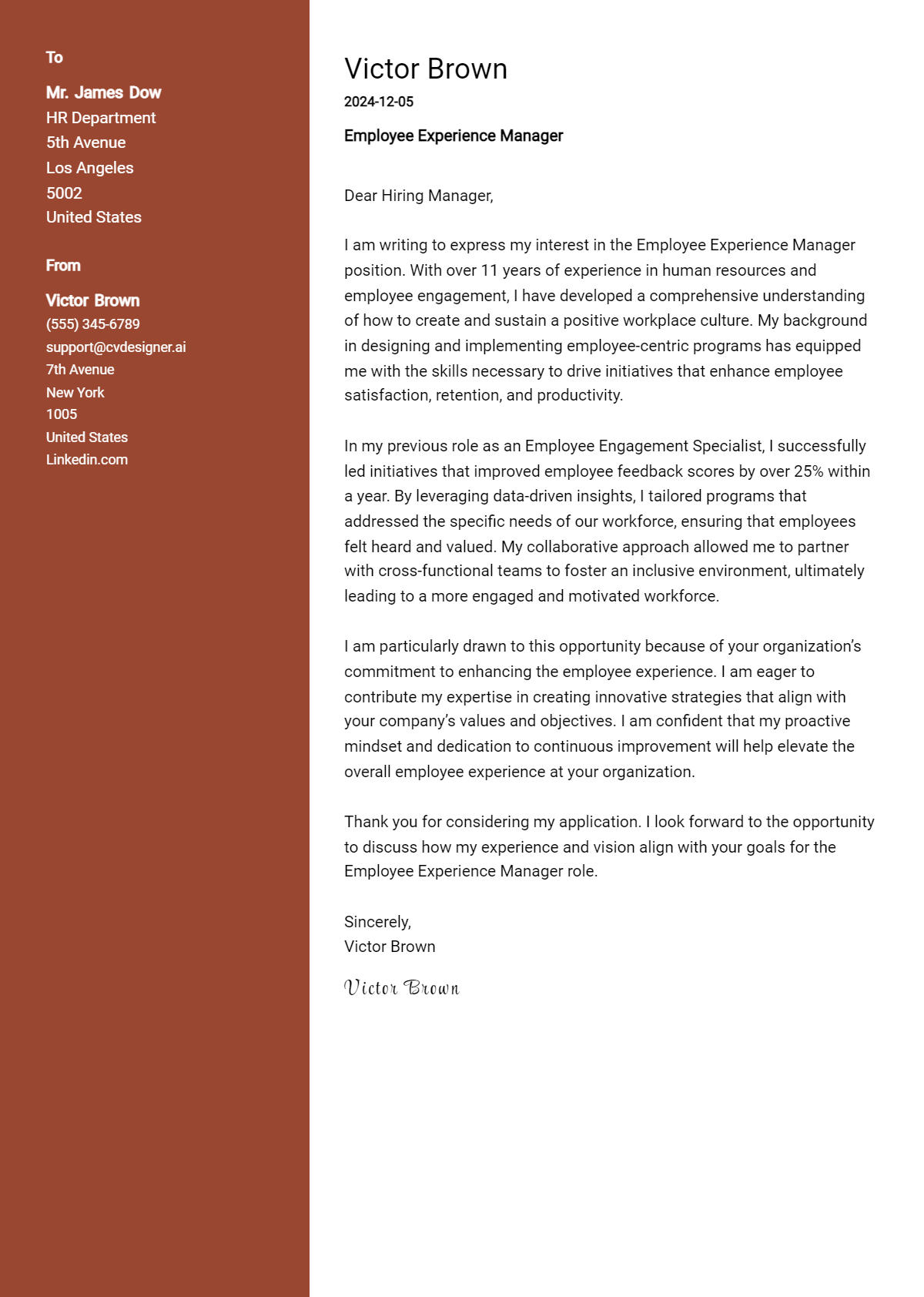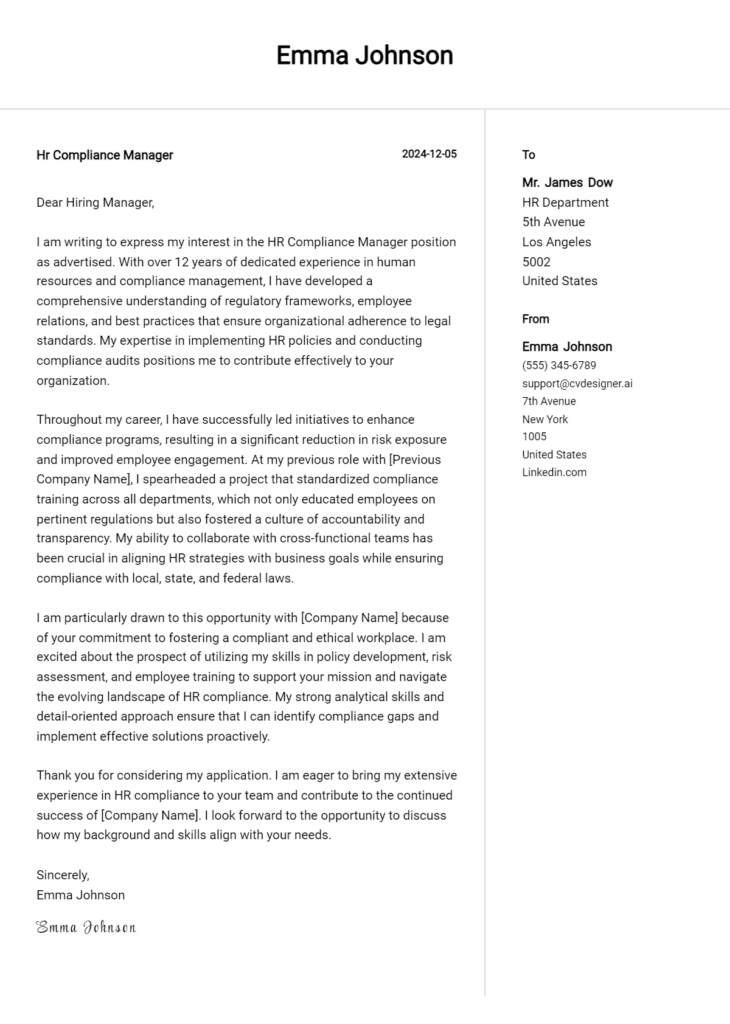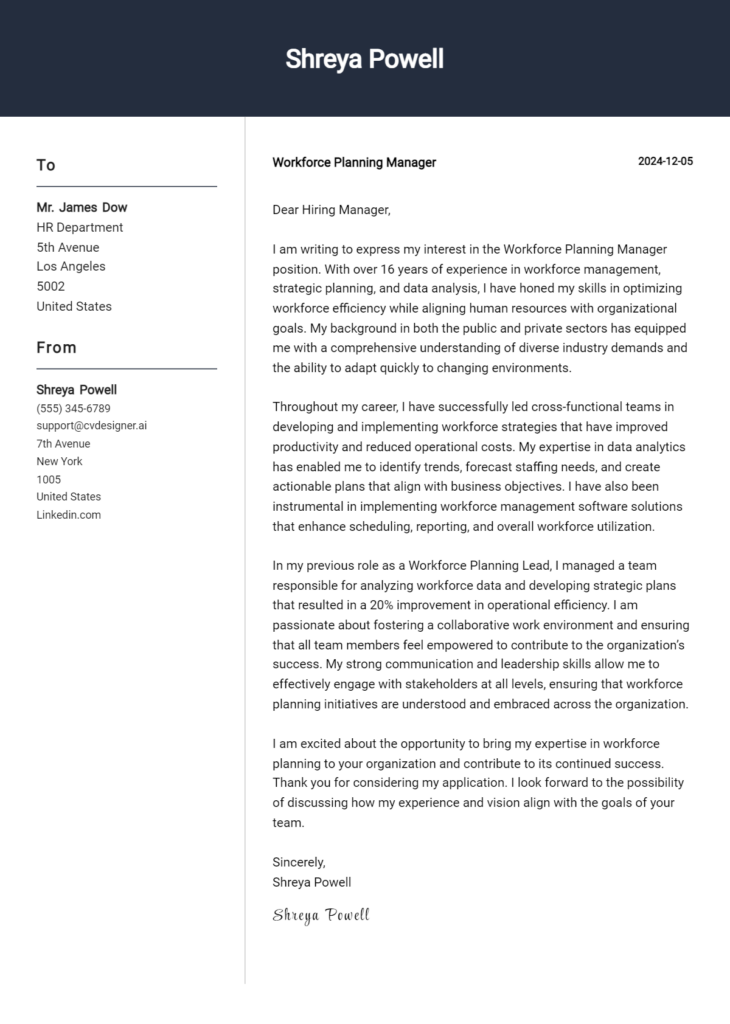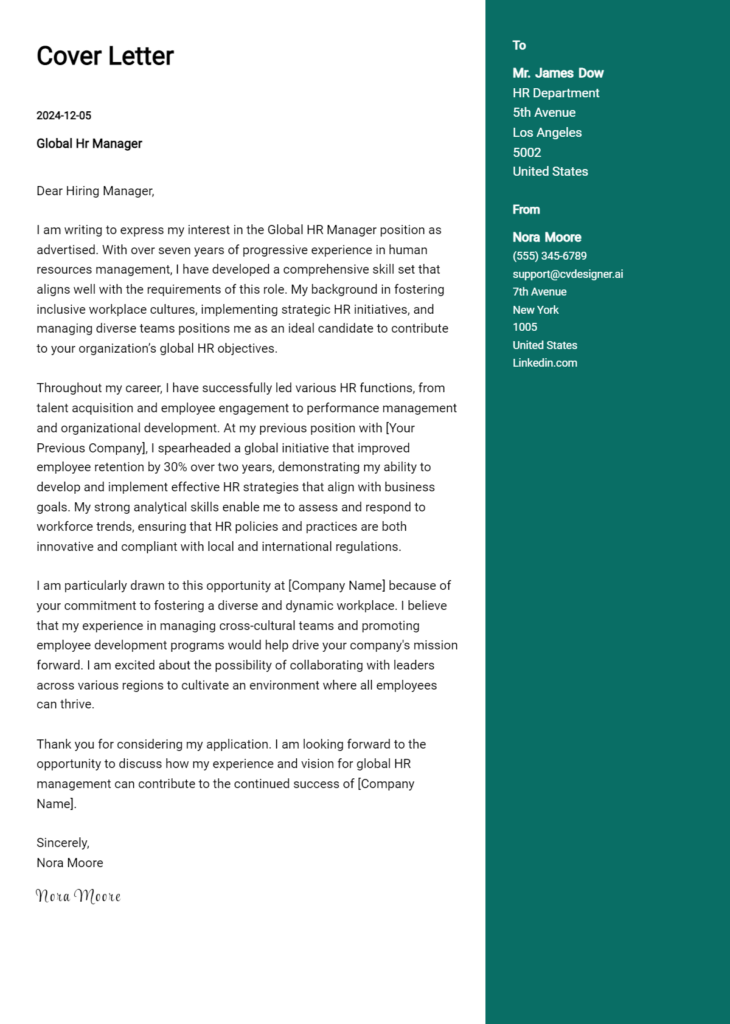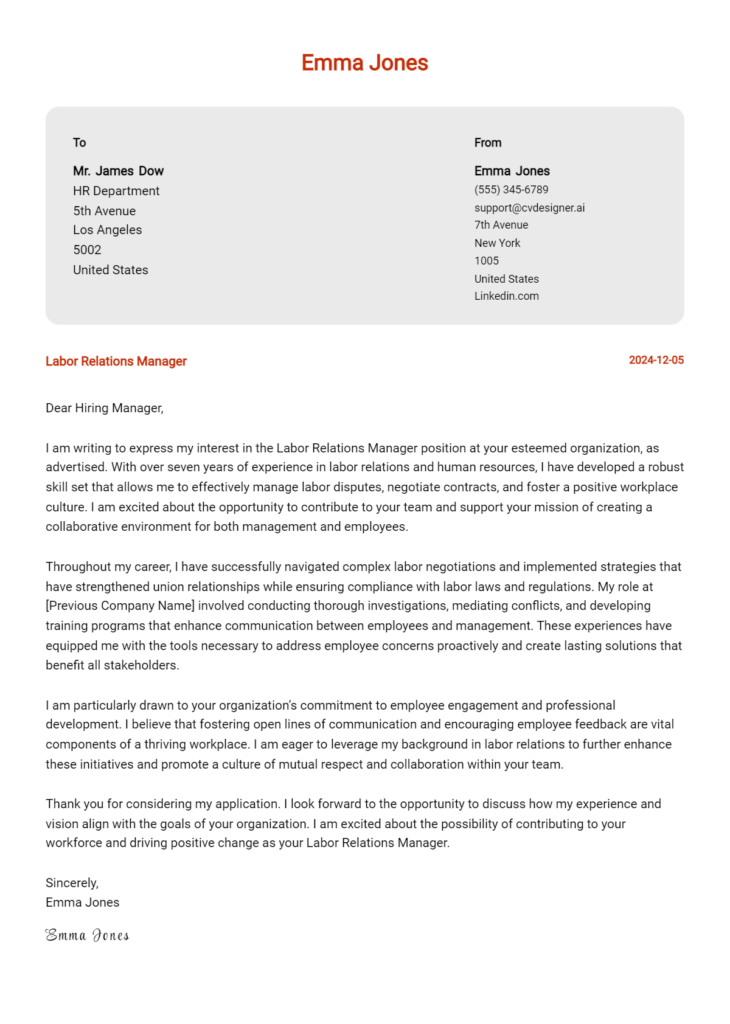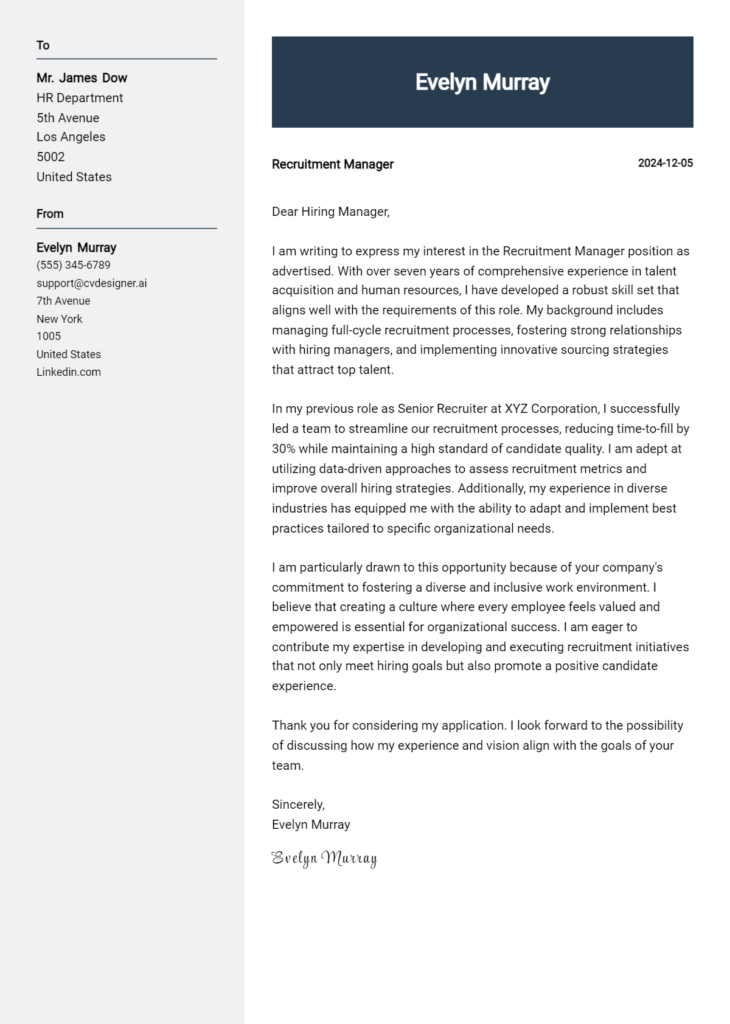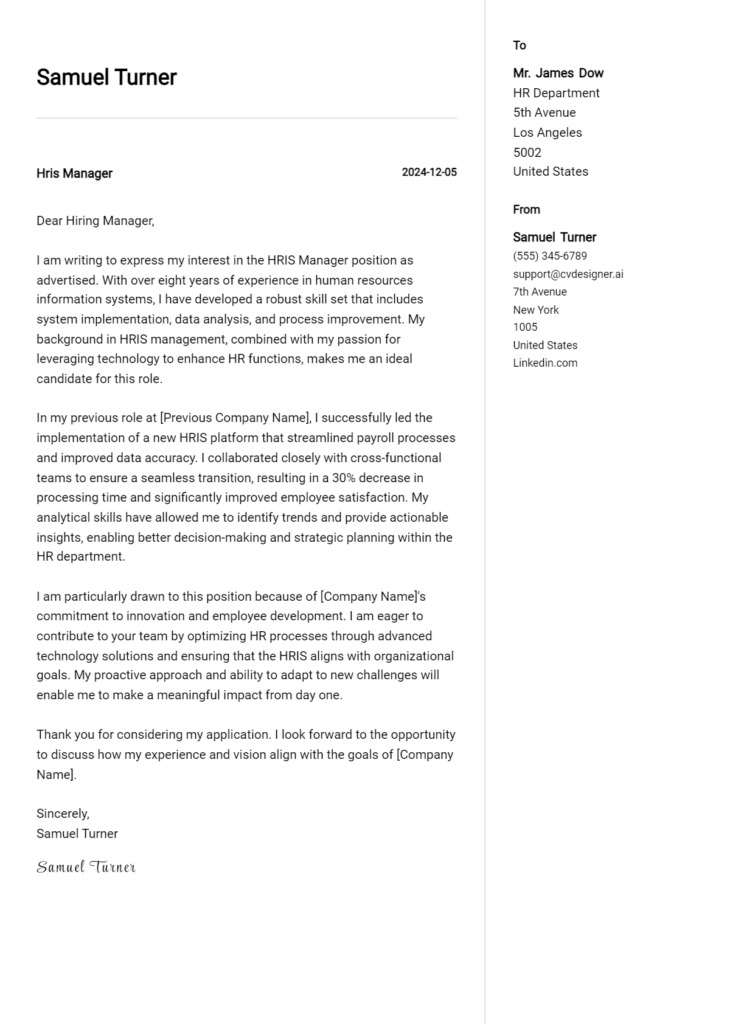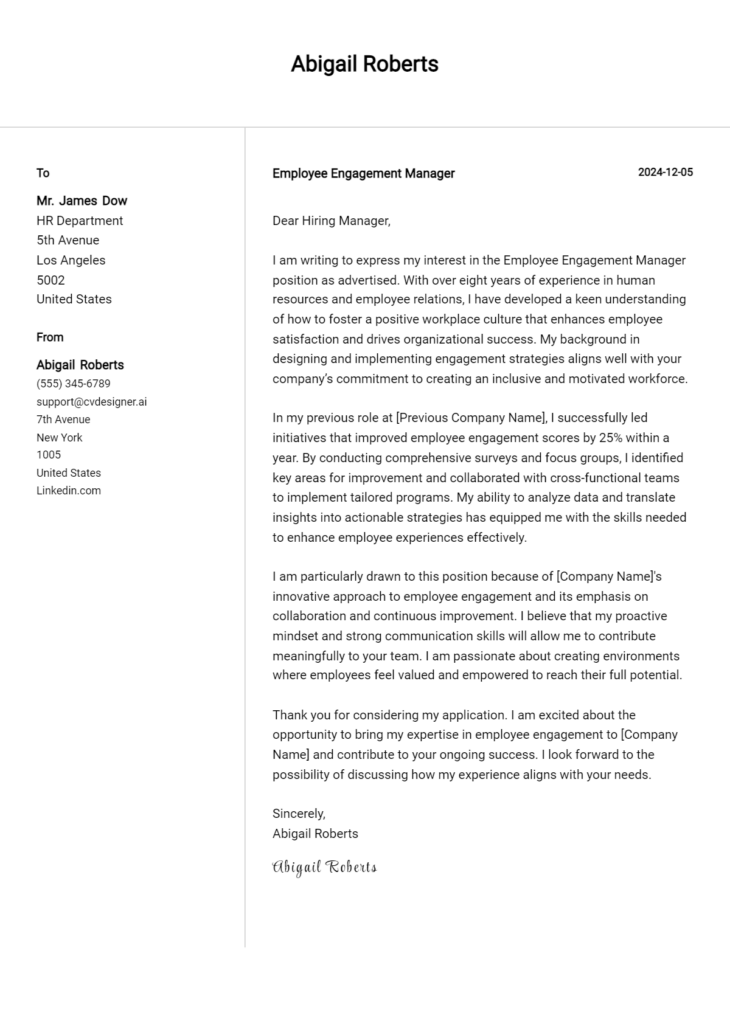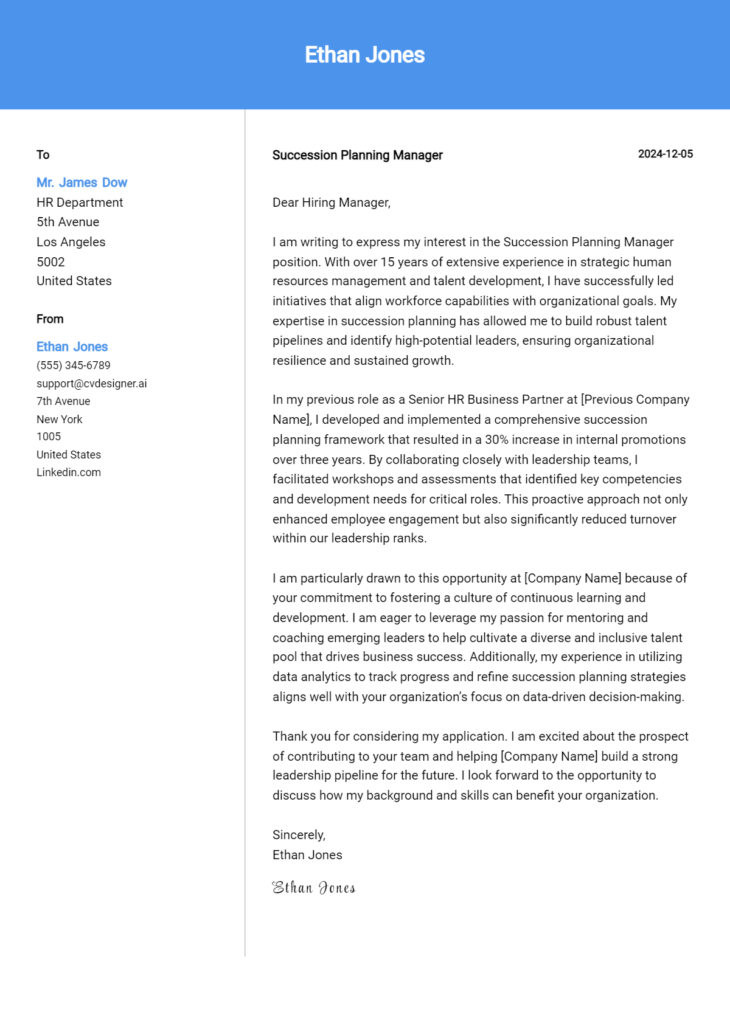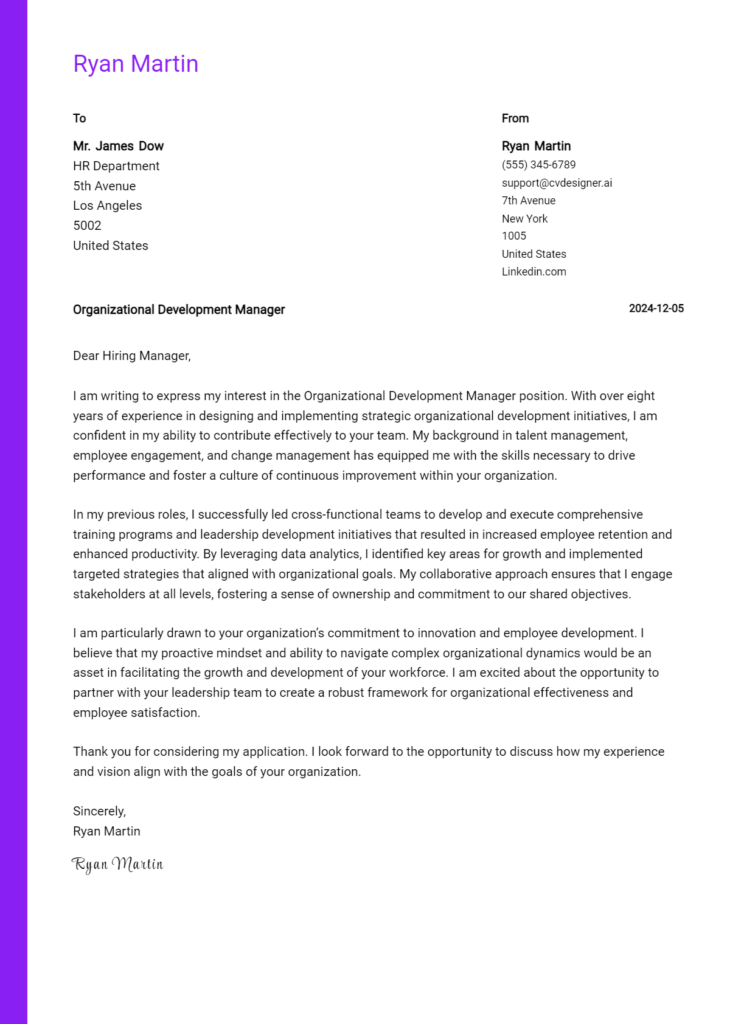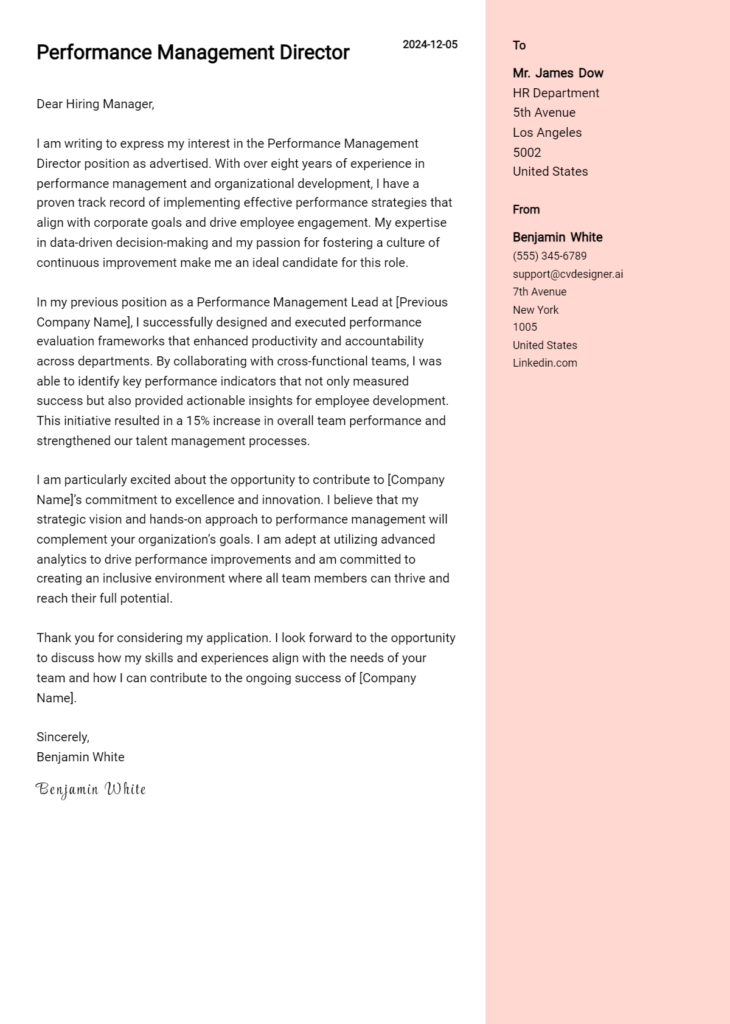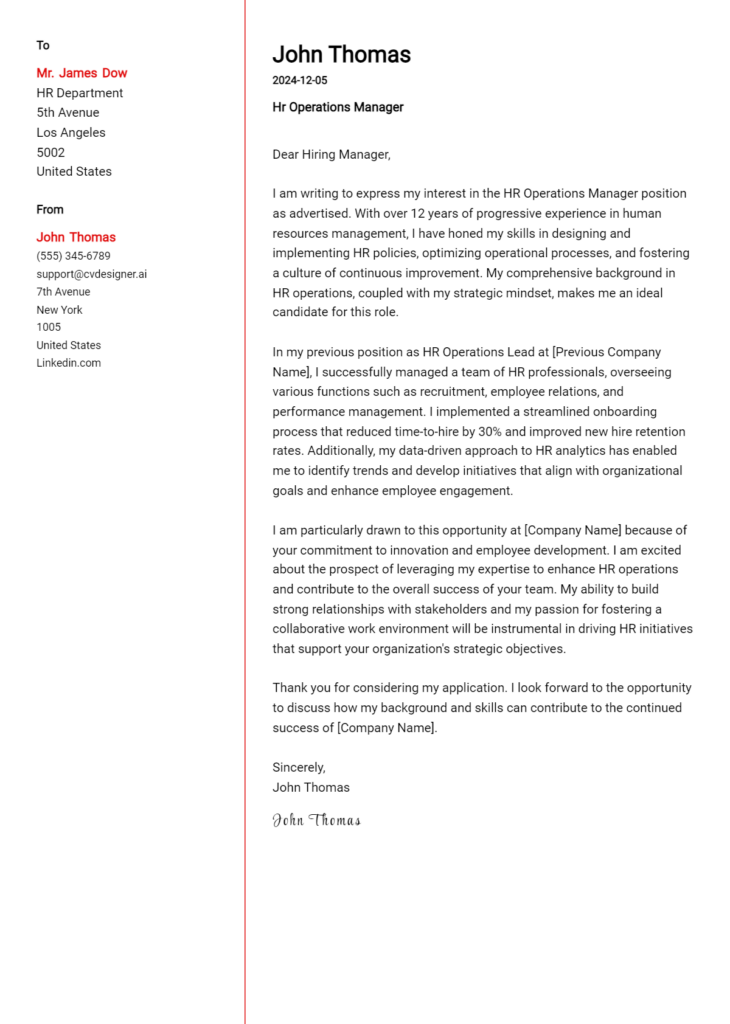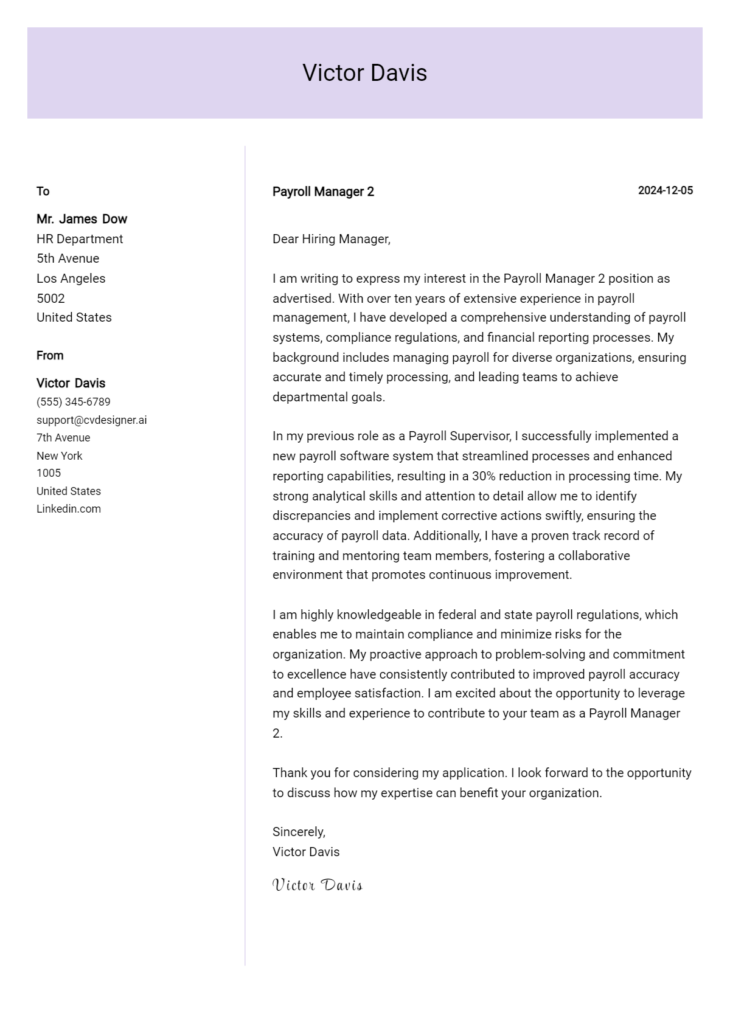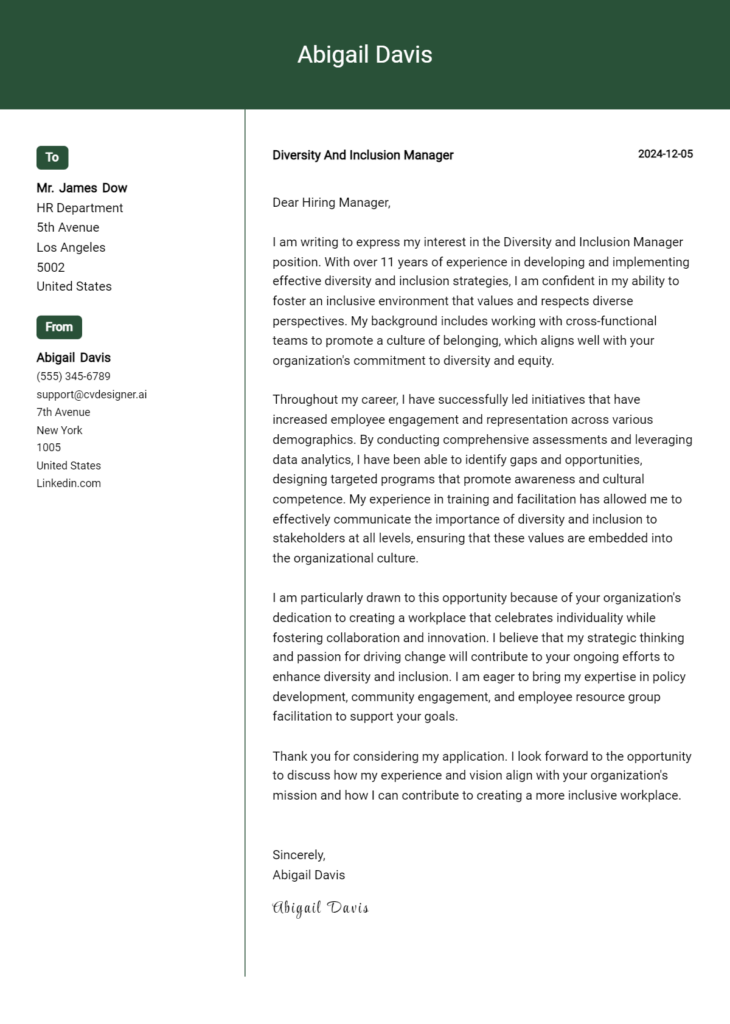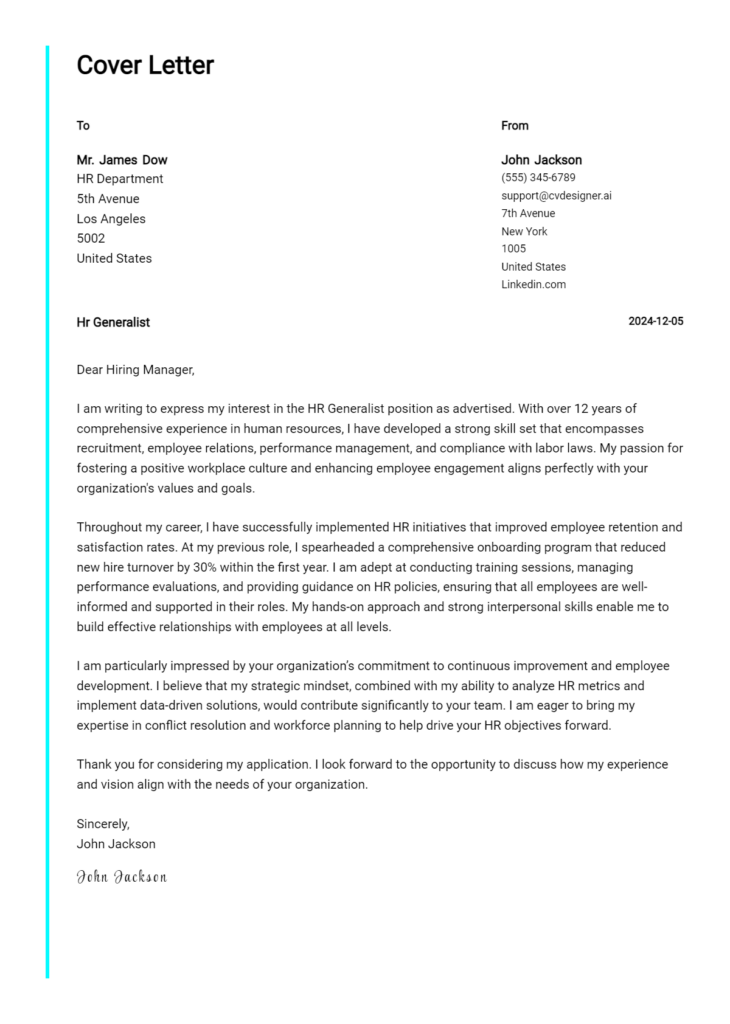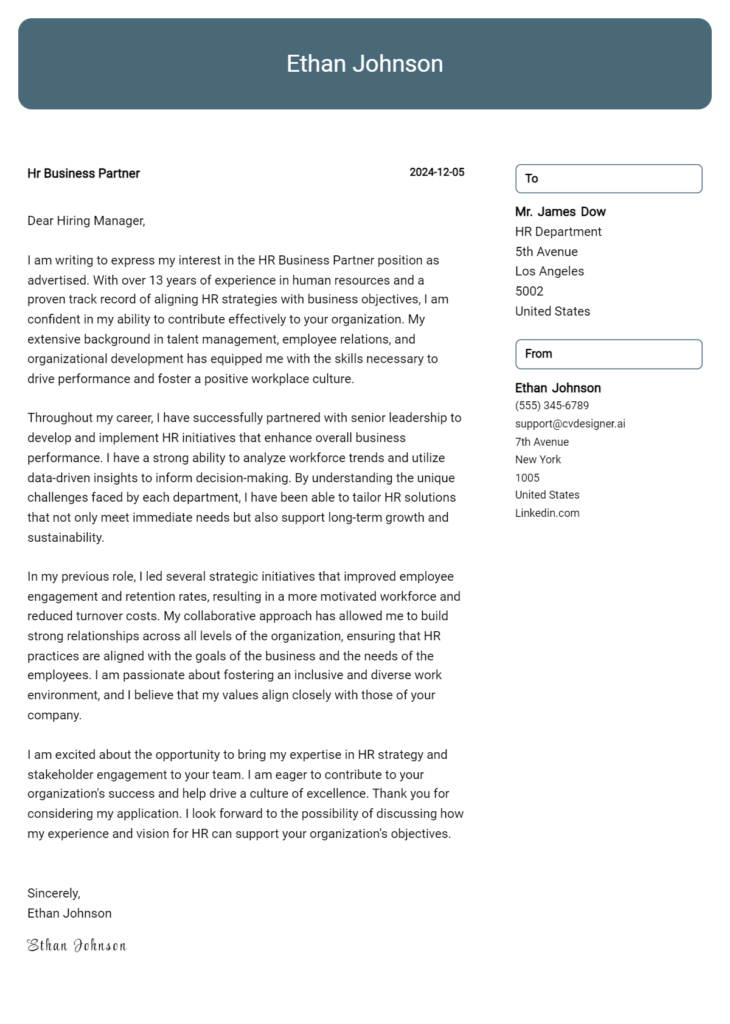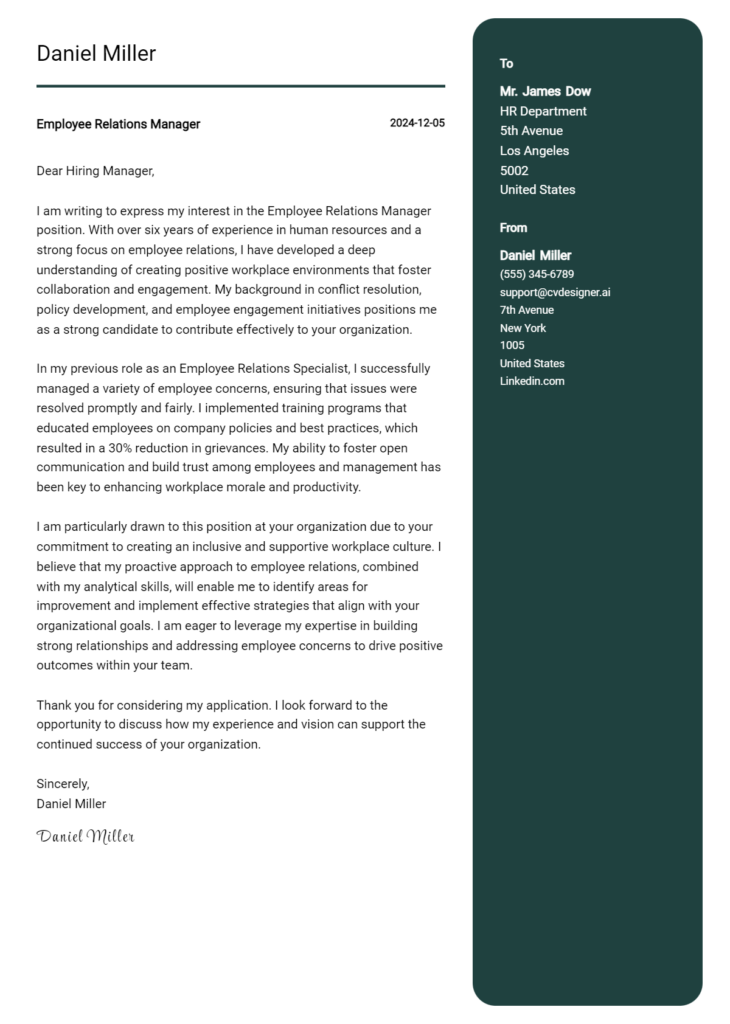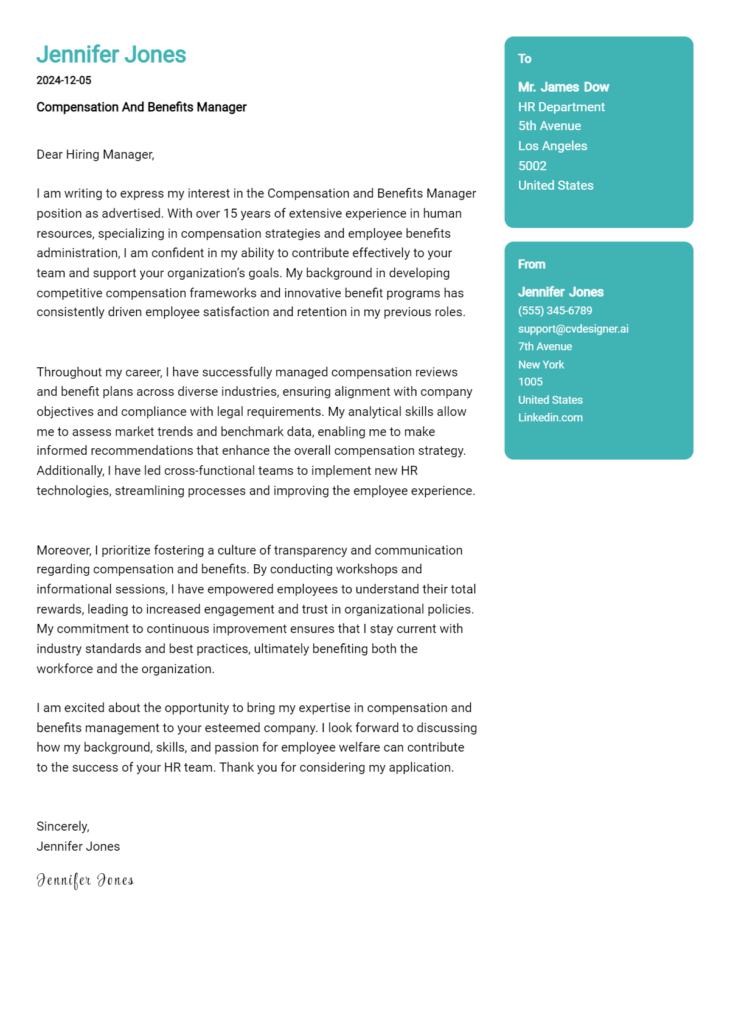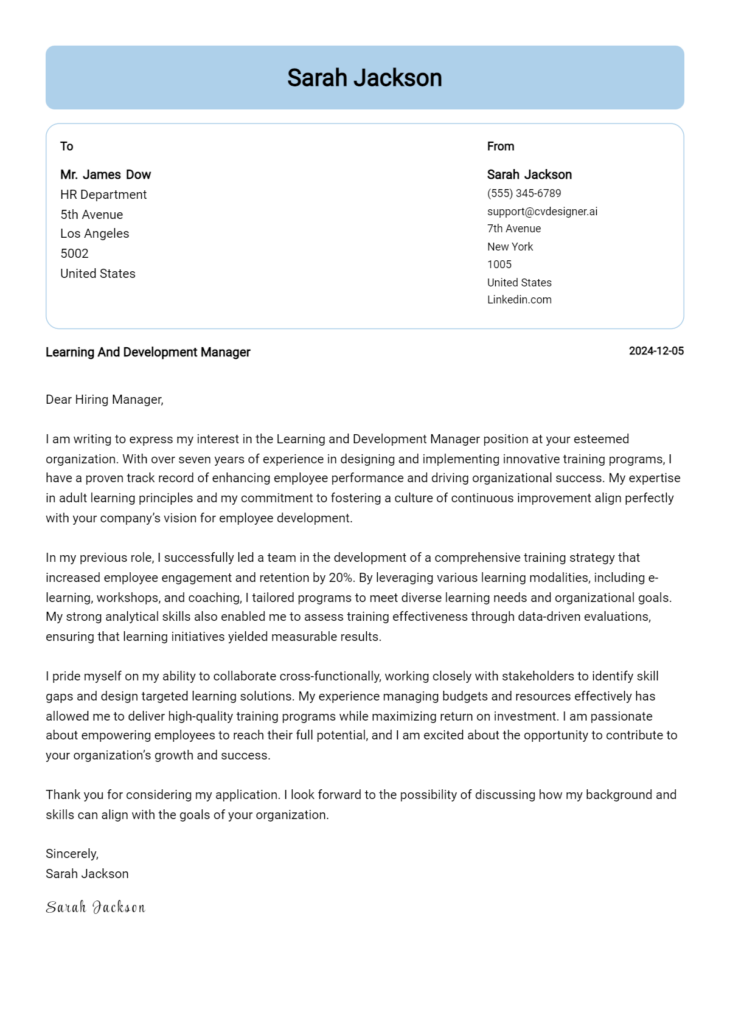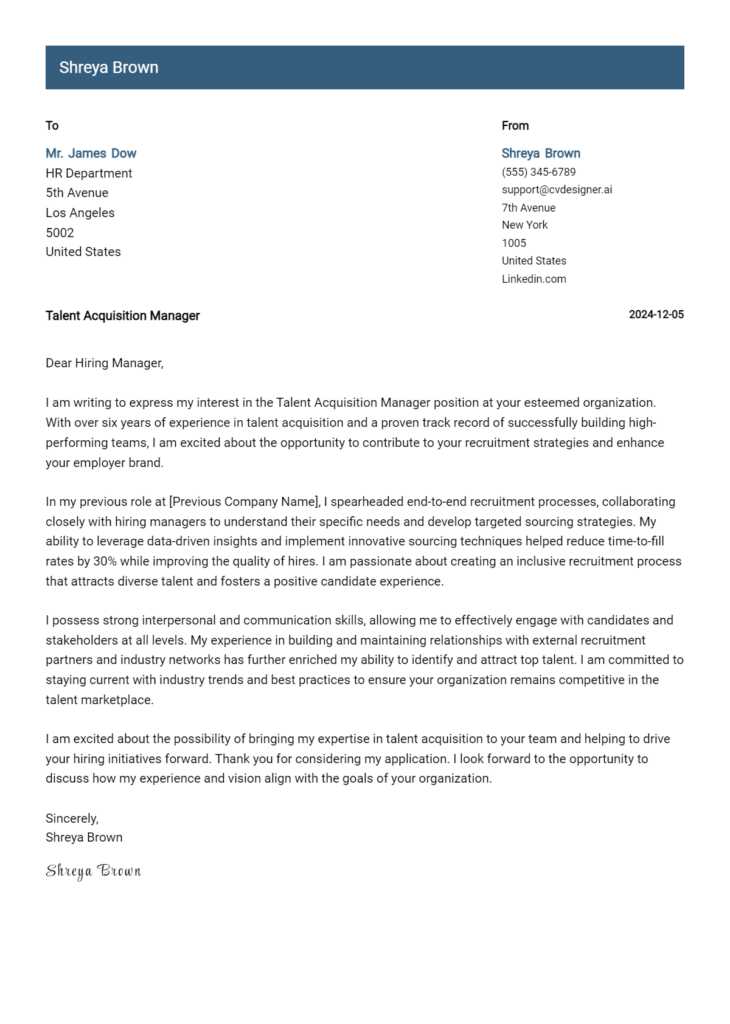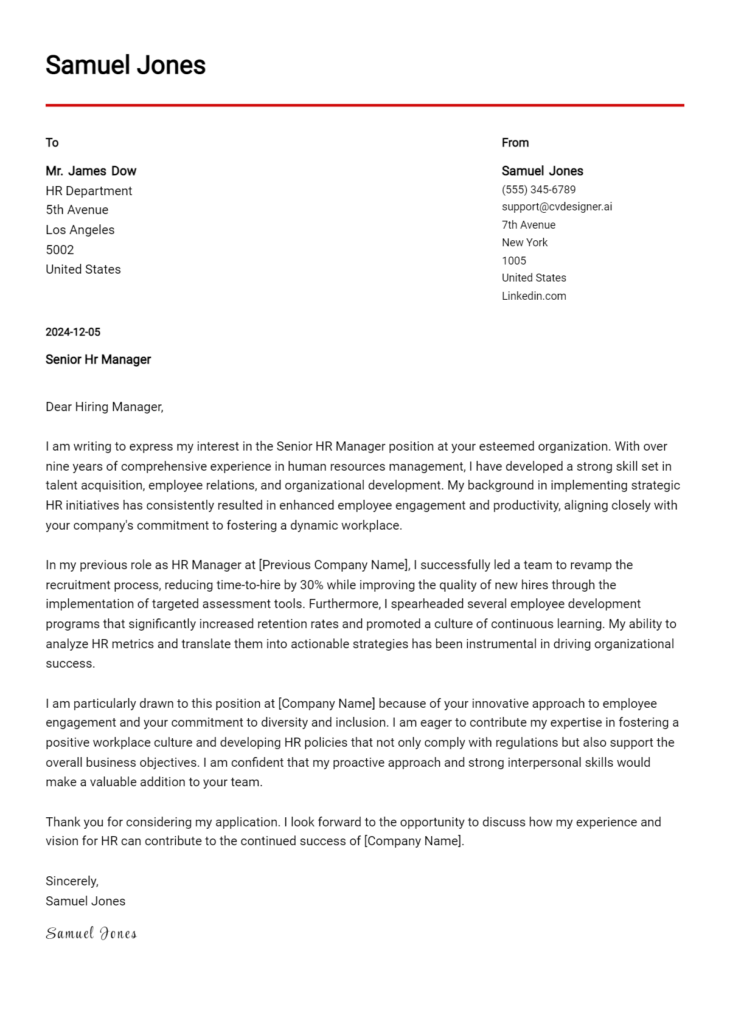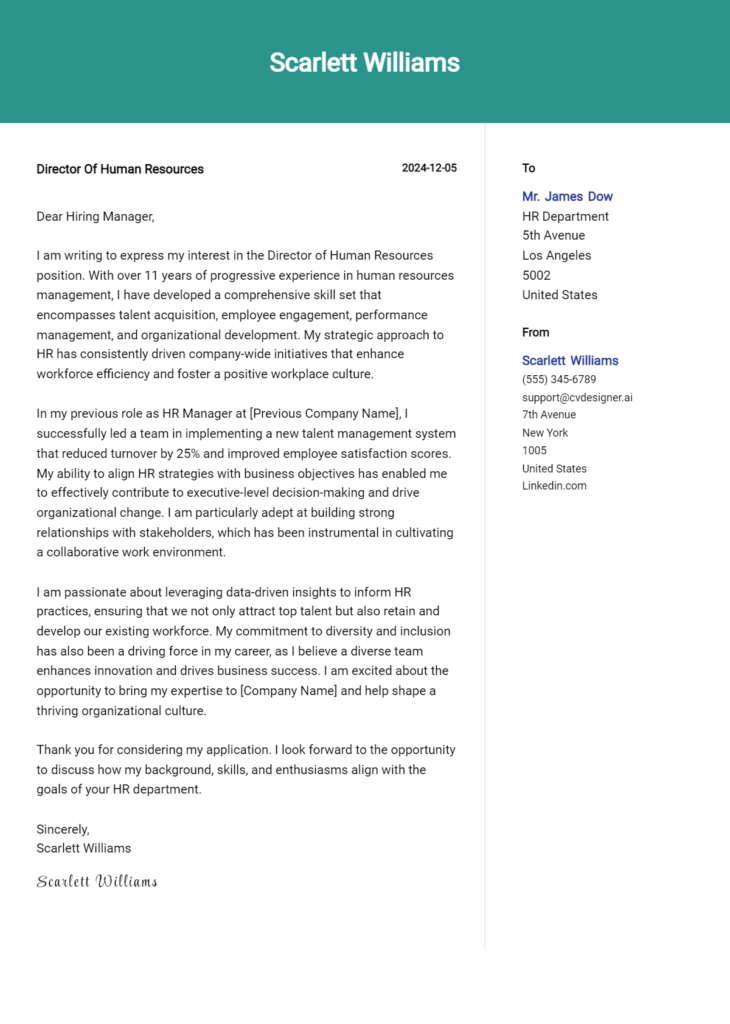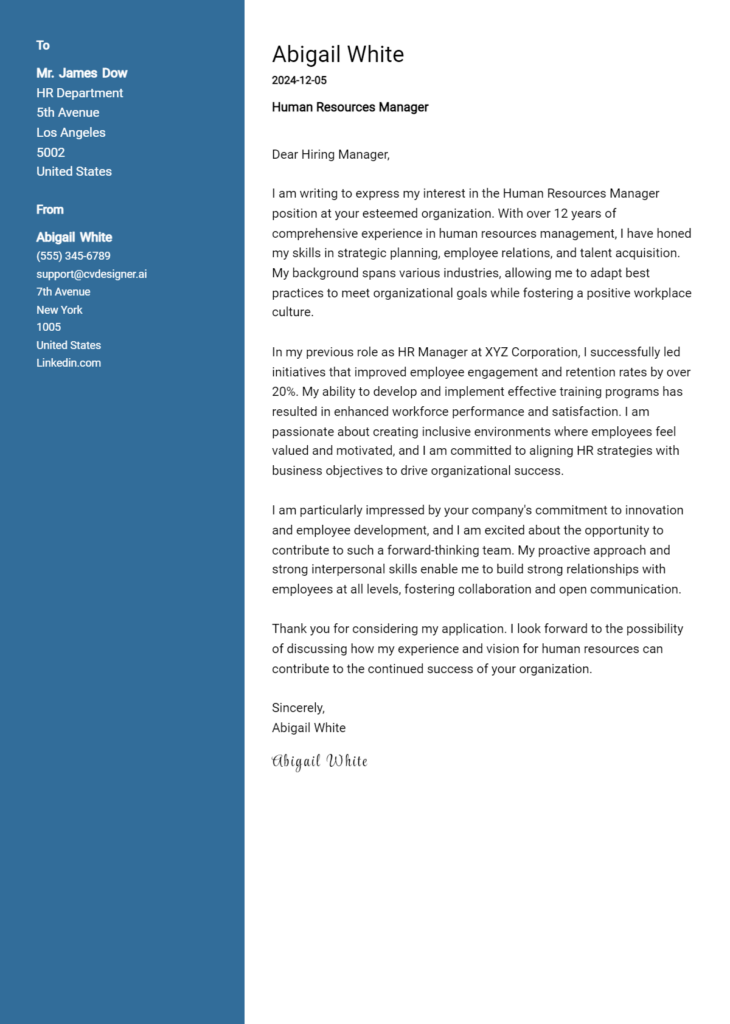Employee Experience Manager Cover Letter Examples
Explore additional Employee Experience Manager cover letter samples and guides and see what works for your level of experience or role.
How to Format an Employee Experience Manager Cover Letter
Crafting a compelling cover letter is essential for an Employee Experience Manager, as it serves as your first opportunity to showcase your understanding of employee engagement and organizational culture. The way you format your cover letter not only reflects your professionalism but also demonstrates your ability to create a positive employee experience from the outset. A well-structured cover letter can capture the hiring manager's attention and set the tone for your application, emphasizing your commitment to fostering a thriving workplace.
In this guide, we will outline how to effectively structure your cover letter, focusing on key elements that will highlight your qualifications and expertise in employee experience management.
We'll delve into the crucial components of a professional cover letter, including:
- Cover Letter Header
- Cover Letter Greeting
- Cover Letter Introduction
- Cover Letter Body
- Cover Letter Closing
Each section is vital for showcasing your skills and aligning them with the needs of the organization. Let’s break down each part to help you create a standout cover letter that reflects your passion for enhancing employee experiences.
Importance of the Cover Letter Header for an Employee Experience Manager
The cover letter header is a crucial element of your application as an Employee Experience Manager, as it sets the tone for the entire document and provides essential information at a glance. A well-structured header not only presents your contact details but also shows attention to detail and professionalism—qualities that are vital in HR roles. The header should include your name, phone number, email address, the date of application, and the recipient's details, such as the hiring manager's name, title, and company information. Clarity and professionalism in the header reflect your organizational skills and commitment to creating an exceptional employee experience.
Strong Example
Jane Doe 123 Main Street Cityville, ST 12345 (123) 456-7890 jane.doe@email.com October 1, 2023 Mr. John Smith Hiring Manager XYZ Corporation 456 Corporate Blvd Cityville, ST 12345
Weak Example
jane.doe@email.com October 1, 2023 XYZ Corp
The Importance of a Strong Cover Letter Greeting
The greeting of your cover letter is crucial as it sets the tone for the rest of your application. A well-crafted greeting not only demonstrates professionalism but also showcases your ability to personalize your communication, which is particularly important for a role like Employee Experience Manager, where relationship-building is key. Addressing the hiring manager directly indicates that you have done your research and are genuinely interested in the position. To avoid generic greetings, take the time to find out the hiring manager's name. If that information isn't readily available, a thoughtful alternative can still keep your greeting engaging.
Strong Greeting Example
Dear Ms. Jane Smith,
Weak Greeting Example
To Whom It May Concern,
By choosing a strong greeting, you set a positive and engaging tone for the rest of your cover letter, showing your enthusiasm and commitment to the role.
The Importance of a Strong Cover Letter Introduction for an Employee Experience Manager
A well-crafted cover letter introduction is crucial for an Employee Experience Manager, as it serves as the first impression for the hiring manager. This opening paragraph should not only capture their attention but also convey the candidate's genuine interest in the role. Furthermore, it should briefly highlight key skills or achievements that align with the job requirements. A compelling introduction can set the tone for the rest of the letter, making it essential to strike the right balance between professionalism and enthusiasm.
Strong Example:
Dear [Hiring Manager's Name], As a passionate advocate for employee engagement and workplace culture, I am thrilled to apply for the Employee Experience Manager position at [Company Name]. With over five years of experience in enhancing employee satisfaction through targeted initiatives, I successfully increased employee retention rates by 30% in my previous role at [Previous Company]. I am eager to bring my expertise in creating inclusive environments and fostering strong communication to your team, ensuring that [Company Name] continues to thrive as a leader in employee experience.
Weak Example:
Hello, I am writing to apply for the Employee Experience Manager position. I have worked in HR for a few years and think I would be a good fit. I have some experience with employee programs, and I believe I can do well in this role.
Purpose of the Cover Letter Body for an Employee Experience Manager
The body of a cover letter for an Employee Experience Manager plays a crucial role in showcasing a candidate's skills, experiences, and the unique value they can bring to the company. This section should detail specific projects or accomplishments that demonstrate the candidate’s ability to enhance employee engagement, improve workplace culture, and drive organizational effectiveness. By providing concrete examples, the candidate can illustrate their strategic thinking and successful implementation of employee initiatives, making a compelling case for their fit within the organization.
Strong Example
I am excited to apply for the Employee Experience Manager position at XYZ Corp, where I can leverage my extensive experience in employee engagement strategies. In my previous role at ABC Inc., I spearheaded a company-wide initiative to revamp the onboarding process, which resulted in a 30% increase in new hire retention rates over the first year. Additionally, I implemented an employee feedback system that led to a 15% improvement in overall job satisfaction scores within six months. These projects not only enhanced the employee experience but also aligned with our organizational goals of creating a more inclusive and collaborative workplace culture.
Weak Example
I think I would be a good fit for the Employee Experience Manager position. I have worked in HR for several years and have done some employee engagement work. I helped organize a few events and think they went well. I know how to talk to employees and gather their opinions. I believe I can make a difference at your company.
Importance of Cover Letter Closing for Employee Experience Manager
The closing paragraph of a cover letter is crucial for leaving a lasting impression on hiring managers, especially for a role like Employee Experience Manager. It serves to summarize your qualifications, reiterate your enthusiasm for the position, and encourage the reader to take the next step, such as reviewing your resume or scheduling an interview. A strong closing can reinforce your fit for the role and demonstrate your proactive attitude, while a weak closing may come off as indifferent or unenthusiastic.
Strong Example
Thank you for considering my application for the Employee Experience Manager position. I am excited about the opportunity to leverage my extensive background in employee engagement and organizational development to enhance the overall experience at your company. I look forward to the possibility of discussing how my skills can contribute to your team. Please feel free to review my resume for more details on my experience, and I hope to discuss my candidacy further in an interview soon.
Weak Example
I guess that’s it for now. I hope you look at my resume. Thanks for your time.
Crafting an effective cover letter for the role of an Employee Experience Manager is crucial in making a lasting impression on potential employers. This position not only requires a deep understanding of employee engagement and organizational culture but also necessitates a robust set of technical skills, problem-solving abilities, and knowledge of the software development life cycle (SDLC). Additionally, showcasing your teamwork capabilities and passion for continuous learning will further strengthen your application. The following tips will guide you in highlighting these essential aspects in your cover letter.
Tips for Writing a Cover Letter for Employee Experience Manager
Highlight Relevant Technical Skills: Make sure to explicitly mention any technical skills that are relevant to the role, such as familiarity with HR software, data analysis tools, or employee engagement platforms. This demonstrates your ability to leverage technology for enhancing employee experiences. Consider using cover letter templates to find a structure that allows you to showcase these skills effectively.
Showcase Problem-Solving Abilities: Employers value candidates who can identify challenges and propose effective solutions. Include specific examples from your past experiences where you successfully addressed issues related to employee satisfaction or engagement. This not only illustrates your problem-solving capabilities but also shows your proactive approach to improving the workplace.
Demonstrate Knowledge of SDLC: If applicable, mention your understanding of the software development life cycle, especially if the company utilizes technology to manage employee experiences. Explain how your knowledge can contribute to optimizing processes and improving collaboration between teams, thereby enhancing overall employee satisfaction.
Emphasize Teamwork and Collaboration: The role of an Employee Experience Manager often involves working closely with various departments. Highlight your teamwork experiences, such as leading cross-functional initiatives or collaborating on projects that improved employee engagement. This will convey your ability to work harmoniously within teams and your commitment to fostering a positive workplace culture.
Express Passion for Continuous Learning: In today's fast-paced work environment, a commitment to continuous learning is essential. Mention any professional development courses, certifications, or workshops you have attended that relate to employee experience, HR trends, or leadership. This shows your dedication to staying updated and adapting to new challenges, making you a valuable asset to any organization.
By incorporating these tips into your cover letter, you can craft a compelling narrative that showcases your qualifications for the Employee Experience Manager role. If you need further assistance, consider using a cover letter builder to help you create a polished and professional document.
Common Mistakes to Avoid in an Employee Experience Manager Cover Letter
Crafting a compelling cover letter for the Employee Experience Manager role is essential, as it serves as your first impression to potential employers. Avoiding common mistakes can significantly increase your chances of standing out. Here are some pitfalls to be mindful of:
Generic Greetings: Using "To Whom It May Concern" can appear impersonal. Instead, research the hiring manager's name and personalize your greeting.
Lack of Specificity: Failing to mention specific achievements or experiences that relate to employee experience can weaken your case. Tailor your content to highlight relevant accomplishments.
Overly Lengthy Letters: A cover letter should be concise. Aim for one page and focus on the most pertinent information. Refer to cover letter format guidelines for structure.
Neglecting the Company Culture: Not aligning your cover letter with the company’s culture can be detrimental. Show that you've done your homework and understand their values and mission.
Typos and Grammatical Errors: Mistakes can give an impression of carelessness. Always proofread your letter to ensure it’s error-free.
Focusing Solely on Yourself: While it's important to showcase your skills, it's equally vital to address how you can contribute to the company. Frame your experiences in a way that benefits the employer.
Using Clichés: Phrases like "hardworking" or "team player" can come off as vague. Instead, provide examples that demonstrate these qualities in action.
By steering clear of these common errors, you can present a polished cover letter that effectively communicates your qualifications. For inspiration, check out these cover letter examples to see what works best.
Cover Letter FAQs for Employee Experience Manager
What should I include in my cover letter for an Employee Experience Manager position?
In your cover letter, focus on showcasing your understanding of employee engagement, workplace culture, and talent development. Start with a compelling introduction that expresses your enthusiasm for the role and the organization. Highlight your relevant experience in designing employee programs, improving workplace satisfaction, or implementing feedback mechanisms. Include specific examples of past achievements, such as increased employee retention rates or successful onboarding processes. Additionally, mention your familiarity with HR metrics and how you use data to drive employee experience improvements. Finally, convey your passion for fostering a positive work environment and your alignment with the company's values.
How can I demonstrate my understanding of employee experience in my cover letter?
To demonstrate your understanding of employee experience, use your cover letter to discuss key concepts such as engagement, culture, and inclusion. Reference any relevant frameworks or methodologies you have used, such as employee surveys or focus groups that you implemented to gather insights. Share specific initiatives you have led or participated in, detailing their outcomes. For instance, if you have launched a wellness program or diversity initiative, explain how it enhanced the overall employee experience. Tailoring your examples to the specific company and its culture will reinforce your knowledge and show your genuine interest in contributing to their employee experience strategy.
Should I include quantitative results in my cover letter?
Yes, including quantitative results in your cover letter can significantly strengthen your application for an Employee Experience Manager role. Metrics provide concrete evidence of your impact and effectiveness in previous positions. For instance, you could mention a percentage increase in employee satisfaction scores following a program you implemented or the number of employees who participated in an engagement initiative. Quantifiable achievements not only showcase your success but also demonstrate your ability to leverage data-driven insights to inform employee experience strategies. Be sure to present these results clearly, linking them back to the skills and experiences relevant to the role you are applying for.
How do I tailor my cover letter for a specific company?
To tailor your cover letter for a specific company, start by researching the organization’s culture, values, and recent initiatives related to employee experience. Reference their mission statement and any employee-centric practices they promote, such as diversity, equity, and inclusion efforts. Use this information to align your experiences and skills with their needs. For example, if the company emphasizes a strong sense of community, mention how you have fostered team-building activities in past roles. Additionally, address any specific challenges the company may face in employee engagement and describe how your expertise can help overcome them. Personalizing your cover letter in this way shows your genuine interest in the company and your commitment to enhancing their employee experience.
Build your Cover Letter in minutes
Use an AI-powered cover letter builder and have your letter done in 5 minutes. Just select your template and our software will guide you through the process.

